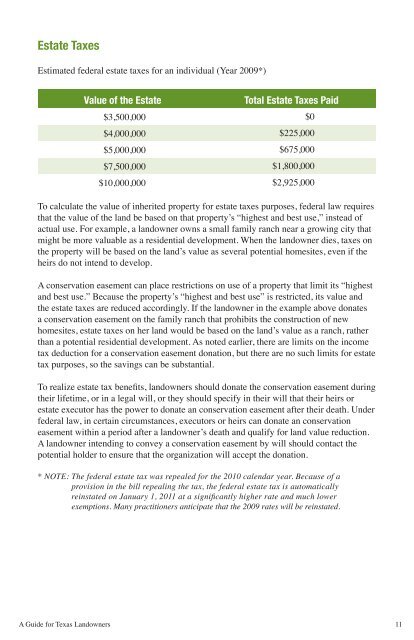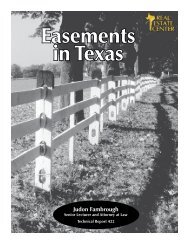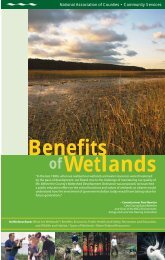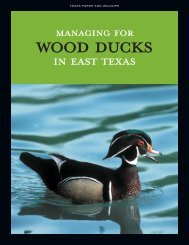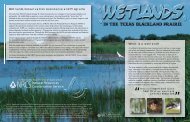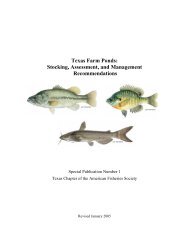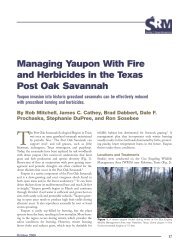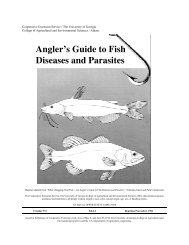Conservation Easements, A Guide for Texas Landowners
Conservation Easements, A Guide for Texas Landowners
Conservation Easements, A Guide for Texas Landowners
You also want an ePaper? Increase the reach of your titles
YUMPU automatically turns print PDFs into web optimized ePapers that Google loves.
Estate Taxes<br />
Estimated federal estate taxes <strong>for</strong> an individual (Year 2009*)<br />
Value of the Estate<br />
Total Estate Taxes Paid<br />
$3,500,000 $0<br />
$4,000,000 $225,000<br />
$5,000,000 $675,000<br />
$7,500,000 $1,800,000<br />
$10,000,000 $2,925,000<br />
To calculate the value of inherited property <strong>for</strong> estate taxes purposes, federal law requires<br />
that the value of the land be based on that property’s “highest and best use,” instead of<br />
actual use. For example, a landowner owns a small family ranch near a growing city that<br />
might be more valuable as a residential development. When the landowner dies, taxes on<br />
the property will be based on the land’s value as several potential homesites, even if the<br />
heirs do not intend to develop.<br />
A conservation easement can place restrictions on use of a property that limit its “highest<br />
and best use.” Because the property’s “highest and best use” is restricted, its value and<br />
the estate taxes are reduced accordingly. If the landowner in the example above donates<br />
a conservation easement on the family ranch that prohibits the construction of new<br />
homesites, estate taxes on her land would be based on the land’s value as a ranch, rather<br />
than a potential residential development. As noted earlier, there are limits on the income<br />
tax deduction <strong>for</strong> a conservation easement donation, but there are no such limits <strong>for</strong> estate<br />
tax purposes, so the savings can be substantial.<br />
To realize estate tax benefits, landowners should donate the conservation easement during<br />
their lifetime, or in a legal will, or they should specify in their will that their heirs or<br />
estate executor has the power to donate an conservation easement after their death. Under<br />
federal law, in certain circumstances, executors or heirs can donate an conservation<br />
easement within a period after a landowner’s death and qualify <strong>for</strong> land value reduction.<br />
A landowner intending to convey a conservation easement by will should contact the<br />
potential holder to ensure that the organization will accept the donation.<br />
* NOTE: The federal estate tax was repealed <strong>for</strong> the 2010 calendar year. Because of a<br />
provision in the bill repealing the tax, the federal estate tax is automatically<br />
reinstated on January 1, 2011 at a significantly higher rate and much lower<br />
exemptions. Many practitioners anticipate that the 2009 rates will be reinstated.<br />
A <strong>Guide</strong> <strong>for</strong> <strong>Texas</strong> <strong>Landowners</strong><br />
11


